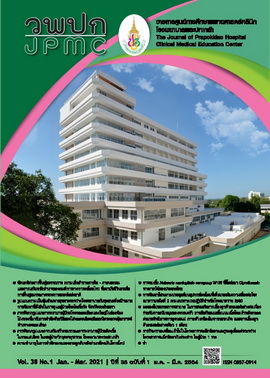Effect of a nursing program for continuous breastfeeding promotion with family support and early skin to skin contact on effective suckling breastfeed, neonatal jaundice, and exclusive breastfeeding at one month
Main Article Content
Abstract
BACKGROUND: The effectiveness of breastfeeding, neonatal jaundice from inadequate breast milk, and exclusive breastfeeding at one month still remain major issues that nurses need to pay attention to; therefore, nursing must be developed in order to support mothers who breastfeed their children more effectively.
OBJECTIVES: The current research endeavor aimed to study the effects of a nursing program for continuous breastfeeding promotion with family support and early skin to skin contact on effective suckling breastfeed, neonatal jaundice, and exclusive breastfeeding at one month in comparison with the usual care group.
METHODS: The study adopted a randomized control trial, RCT. The sample included 60 postpartum mothers at Prapokklao Hospital, Chanthaburi, 30 of whom were randomized into the treatment group and the other 30 were randomly chosen into the control group, by means of drawing lots. The research tools included a nursing program for continuous breastfeeding promotion with family support and early skin to skin contact, conducted 7 times in the duration of 2 weeks. The data collection tools comprised questionnaires of general information, the Postpartum Health Record, a suckling efficiency assessment form (LATCH Score), and an interview about breastfeeding conducted after the babies turned one month old. The duration of the research lasted from August to November 2020. The data was analyzed using the independent t-test, the chi-square test, and calculated in terms of the effect size.
RESULTS: Infants that were in the experimental program could effectively latch on at 48 hours and were breastfed alone at one month old, which was more than those in the control group with the statistical significance (p = 0.005 and p < 0.001, respectively). Furthermore, the bilirubin level of the infants in the treatment group was lower than that of the infants in the control group after 48 hours, with statistical significance (p = 0.04).
CONCLUSIONS: A nursing program for continuous breastfeeding promotion with family support and early skin to skin contact could enhance the efficiency of suckling, reduce the chance to develop neonatal jaundice from insufficient breastfeeding, and increase the chance of exclusive breastfeeding for one month.
Article Details
References
Chiraphaet W, Chiraphaet K. Strategies for successful breastfeeding. Bangkok:Thammada Press; 2020.
National Statistical Office. Thailand multiple indicator cluster survey 2015-2016. Bangkok: UNICEF, Thailand Country Office; 2017.
Ngamgarn W. Report on the results of the promotion of breastfeeding. Chanthaburi: Obstetrics and Gynecology Prapokklao Hospital; 2019.
Kuesakul K, Sinsuksai N, Phahuwatanakorn W, Titapant V. Effects of early maternal-neonate skin to skin contact after birth on effective suckling and exclusive breastfeeding for one month. NursSci J Thail 2019;37(4):66-78.
Kaewkiattikun K, Phathaisiriphat P. Effects of mother-infant skin to skin contact on successful breastfeeding in postpartum mother-infant separation : a randomized controlled trial.Vajira Med J2018; 62: 315-26.
Pender NJ, Murdaugh CL, Parsons MA. Health promotion in nursing practice. 5thed.Singapore: Prntic Hal; 2006.
Mekamol K, Deejapo J, NetkrajangC. Effect of a model of 6-months exclusive breastfeeding promotion based on family-centered care on knowledge, attitude of mothers and families and exclusive breastfeeding for 6 months. Chanthaburi: Prapokklao Nursing College; 2017.
Gravetter FG, Wallnau LB. The chisquarestatistis: Tests for goodness of fit and independence[Internet].2015[cited 2017 Mar 18]. Available from: https://www.slideshare.net/jasondroesch/gw-e8ch15
Cohen J. A power primer.Psychol Bull 1992;112:155-9.
Aghdas K, Talat K, Sepideh B. Effect of immediate and continuous mother-infant skin-to-skin contact on breastfeeding self-efficacy of primiparous women: a randomised control trial. Women Birth 2014;27:37-40.
Karimi FZ, Sadeghi R, Maleki-Saghooni N, Khadivzadeh T. The effect of mother-infant skin to skin contact on success and duration of first breastfeeding: a systematic review and meta-analysis. Taiwan J Obstet ynecol 2019;58:1-9.
Ketsuwan S, Baiya N, Maelhacharoenporn K, Puapornpong P. The association of breastfeeding practices with neonatal jaundice. J Med Assoc Thai 2017;100:255-61.
Hadisuyatmana S, Has EMM, Sebayang SK, Efendi F, Astutik E, Kuswanto H, et al. Women's empowerment and determinants of early initiation of breastfeeding: a scoping review. J Pediatr Nurs 2020; S0882-5963(20)30560-1.
Barona-Vilar C, Escribá-Agüir V, Ferrero-Gandía R. A qualitative approach to social support and breast-feeding decisions. Midwifery 2009;25:187-94.
Phillips R. The sacred hour: uninterrupted skin-to-skin contact immediately after birth. Newborn Infant Nurs Rev 2013; 13: 67–72.

